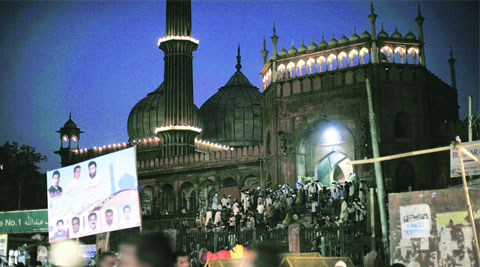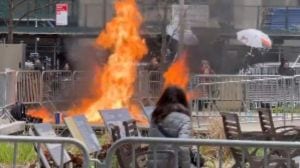- India
- International
The Other Side of Midnight
Sehri walks take visitors through the colours, tastes and smells of the Walled City during Ramzan.
 Shops are open and streets are packed through the night as families in the area step out after their evening meal.
Shops are open and streets are packed through the night as families in the area step out after their evening meal.
Itihaas
For the past three years, Itihaas, an organisation that deals with Indian traditions, has been conducting sehri walks in the city for small groups. “This year, we have opened it up to the public. Sehri is the other side of roza, when we get to see what happens through the night during Ramzan. If people don’t know about it, they are missing out on a vital part of the city’s culture,” says Smita Vats, theatre person and heritage educationist.
Shops are open and streets are packed through the night as families in the area step out after their evening meal. “People stay awake through the night, including children. Look beyond the vibrant environment and you’ll notice a clever science at work. If people don’t get out of the house, most of them will be sleepy, which means they won’t be hungry enough for the sehri, which means they won’t eat properly, which means that the day’s roza will be spoiled. I feel that getting out of the house at night seems essential to roza,” adds Vats.
Itihaas’s sehri walk on July 26 will include a meal prepared by Abdul Ghani, a 15th generation kebab maker, visits to kiosks that spring up during Ramzan and a visit to a Muslim family household to understand the meaning behind roza, Ramzan and Eid. “Every aspect of life here is full of anecdotes. For instance, we can trace the predominance of red chilli in Mughlai food to the hard underground water of the city when it was being built in the 17th century. Without the chilli, people living in Shahjahanabad at that time would not have been able to digest their food,” she says. This is also when nihari (a stew made of meat) is cooked in huge quantities. It acts as a vital fuel for the fasting faithful who will be working without food or water throughout the day.
When: July 26
Timing: 11.30 pm-4 am
Price: Rs 2,000
Contact: 9654401057
Delhi Food Walks
This group stays true to its name with a walk map that’s as eclectic as it is delicious. “One of the special experiences of eating out at the Walled City at this time is visiting those places that sell only one type of dish. Qureshi kebab wala in Jama Masjid makes kebabs and tikkas, Bade Miyan in Chauri Bazar is for kheer that is known as Bade Miyan ke kheer,” says Anubhav Sapra, a walk leader who describes himself as a Foodie-in-Chief of Delhi Food Walks.

He has been conducting sehri walks for three years and knows the corners where specially prepared nahari is available only after 11 pm and who sells the best Tarbooz Roohafza, a drink that was born in these bylanes as a marriage of watermelon pieces and milk, for Rs 10 a glass. Then, there are kiosks around Jama Masjid where you would miss out on the fragrant, flavourful khajla, pheeki jalebi, rabari and sewai if you don’t turn up on time. “Some of these sell out within an hour, so we make sure we are early,” says Sapra.
His route meanders across Ballimaran, through Chawri Bazar, past Matia Mahal towards Jama Masjid, taking in local landmarks such as Haji Hussain Fried Chicken who, many believe, introduced fried chicken to Delhi, and Aslam Butter Chicken, another gastronomic hot spot where one can chew on chicken that has been roasted to crisp-outside-soft-inside consistency before yoghurt and spices (instead of the commonly used tomato gravy) are added and then it is “doused in pure, yellow Amul butter that oozes all over your mouth and fingers as you bite in”. He sounds like someone who has experienced nirvana and decided it tasted good. The sehri walking tour, he hopes, will be
similarly illuminating.
When: July 19
Timing: 11 pm-5 am
Price: Rs 700
Contact: 9891121333
India City Walks
Delhi Walks, a vertical of India City Walks, will conduct a heritage tour through places such as Meena Bazar, historical havelis and mosques of Chooriwalan Gali, with pit stops at popular eating kiosks for kebabs, biryani, kulfi and shahi tukda. “We’ll take a closer look at the lifestyle, architecture and culture during Ramzan,” says Chief Explorer
Sachin Bansal.
When: July 19
Timing: 5.30 pm – 7.30 pm
Price: Rs 1,600 for vegetarians and Rs 2,000 for non-vegetarians
Contact: 9711190192
Delhi Food Walks
The iftar walk promises to chomp away on dishes many Dilliwalas have never heard before. “The Long Chudey Kebab isn’t made of mutton or anything non-vegetarian, it is a besan kebab that is served with a chutney, which is very
hot,” says Anubhav Sapra of Delhi Food Walks.
When: July 6, 13 and 20
Timing: 6 pm – 9pm
Price: Rs 800
Contact: 9891121333
DelhiByFoot
These Walks take you into the home of djinns, Ferozshah Kotla fort on July 17, 5.30 pm-8.30 pm (Rs 750); and bring you close to the rituals in the last days of Ramzan before Chaand Raat, (when the sighting of the new moon heralds Eid) on July 25, 5 pm-9 pm (Rs 1,250). A sehri walk will be held on July 19, from
11.30 pm – 4:30 am (Rs 1,250).
Contact: 9871181775
Apr 19: Latest News
- 01
- 02
- 03
- 04
- 05






































